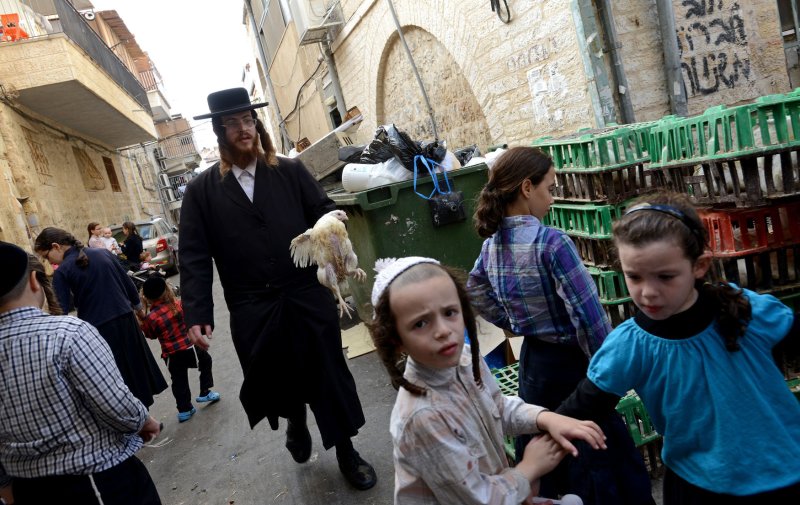1 of 9 | An Ultra-Orthodox Jew carries a chicken for the Kaparot ritual in the Mea Shearim neighborhood in Jerusalem, Israel, October 2, 2014. Kaparot is performed before Yom Kippur by swinging a live chicken over one's head and symbolically transferring one's sins for the past year into the bird, which is butchered and donated to charity. UPI/Debbie Hill |
License Photo
JERUSALEM, Oct. 2 (UPI) -- People of the Jewish faith throughout the world will observe Yom Kippur from sunset October 3 through nightfall on October 4.
Yom Kippur -- from the Hebrew words for "day" and "to atone," literally a day of atonement -- is a joyous time of forgiveness, spiritual renewal, and beginning anew that commemorates God forgiving Israelites their idolatry in worshipping the golden calf.
Considered the holiest day of the year and the most important holiday in the Jewish calendar, Yom Kippur is a day of intense prayer and fasting.
It is also a day temples and synagogues see their highest rate of attendance each year.
Referred to as the Sabbath of Sabbaths, Yom Kippur completes the Jewish High Holy Days, or Days of Awe -- also called the Days of Repentance -- which begin 10 days earlier with Rosh Hashanah, the two-day celebration of the Jewish New Year.
According to tradition, God inscribes each person's fate for the coming year into the Book of Life on Rosh Hashanah and, ten days later, on Yom Kippur, seals this inscription. The time between Rosh Hashanah and Yom Kippur is considered a time of reflection and repentance to seek God's forgiveness for any wrongdoing before one's fate is sealed.
On Yom Kippur, people of the Jewish faith abstain from food, drink, sex, wearing leather, bathing, and anointing with perfumes or oils. It's also traditional to spend most of the day in synagogue, attending the five prayer services associated with the day.
In addition, the holiday is a time for Vidui, public and private confessions of guilt and petitions for forgiveness, and Ne'ilah -- a prayer not included in other Jewish holiday services -- a final plea for repentance before the gates of heaven close.
After the 25-hour fast of Yom Kippur, one hopes to have been forgiven by God.















